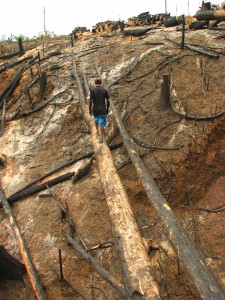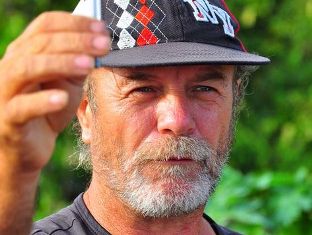This post is part of our special coverage Forest Focus: Amazon
Nilcilene Miguel de Lima, a small rural producer and local leader from the Amazon region, is under protection of the National Force as she has been receiving constant death threats by land-grabbers and illegal loggers.
In the beginning of February, the Brazilian investigative news agency A Pública [pt] went to the town of Lábrea, in the federal state of Amazonia, to interview her:
As ameaças começaram em 2009, quando ela assumiu a presidência da associação Deus Proverá, criada pelos pequenos produtores do assentamento para defender o grupo contra as invasões de terra e roubo de árvores. No ano seguinte, depois de fazer denúncias e abaixo-assinados contra os criminosos, Nilcilene foi espancada e teve sua casa queimada em um incêndio anunciado. Em maio de 2011, foi obrigada a fugir enrolada em um lençol para despistar o pistoleiro que estava de campana no seu portão. A equipe da Força Nacional foi deslocada em outubro para garantir que a líder pudesse voltar para casa e continuar denunciando os problemas da região.
In the video [pt], some of Nilcene declarations are:
Why do we have to live like that? Someone has to fight, to do something. […] The authorities have to take action. […] So many conflicts because of logging and land. […] If the National Force leaves, my partner and I have to leave before them. If we stay, before being killed, we will be tortured. […] Until today, I keep receiving death threats.
Shot dead for protecting the forest
As well as being one of six people under 24 hour protection of the National Force, Nicelene is among 172 people who have received death threats by gunmen in the Brazilian countryside. According to the Comissão Pastoral da Terra (CPT) [pt], an organization which supports rural rights to land and water, this figure has increased 107% compared to 2010, when 83 people were in the same situation.
Last year, as Global Voices reported, the CPT published data which shows that 1,614 people have been murdered in the last 25 years due to rural conflicts. This number includes worldwide known cases as those of Chico Mendes, Dorothy Stang and the Eldorado dos Carajás killing amongst others.
Current information shows that, in total, the number of people coping with pressures imposed by outlaws due to land and water conflicts in Brazil increased from 38.555 in 2010 to 45.595 in 2011. There were 32 executions of workers or local leaders from these communities in 2010 and 23 in 2011, as CPT reported.
The intervention of the National Force to protect local community leaders in the Northern region of Brazil, came also as a consequence of the work of the CPT. The CPT handed in to the Special Secretariat for Human Rights [pt], a body within the Brazilian Ministry of Justice, a list with people under death threat after the murder of Maria do Espírito Santo and her husband José Claudio Ribeiro da Silva in the federal state of Pará shamed the country.
After the brutal murder of the couple, other killings have hit the headlines as those of Adelino Ramos in the federal state of Rondônia and of Nísion Gomes, an indigenous chief, in the Central-Eastern state of Mato Grosso do Sul. CPT asserts that:
Pelo menos 8 das mortes estão diretamente relacionadas com a defesa do meio ambiente. Outras… 2 mortes são de quilombolas e [outras] 2 de indígenas…….A intervenção federal depois dos primeiros assassinatos não foi minimamente suficiente para inibir a ação dos grileiros, proprietários de terra e outros.
An hour length documentary released by the website Vice (English subtitles) has an indepth analysis of the conflicts. An interview that Maria Espirito Santo gave when alive is included in the video. She commented how she felt to be constantly harassed because of her and her husband's commitment to fight against illegal logging:
There are people who keep saying it not worthy it. To me it is worth it. To me, to my husband it is definitely worth it. I know there's a risk, I have no doubt about that. I'd be lying if I said I wasn't afraid.
Another two victims [pt] have been in the spotlight recently: João Chupel Primo and Junior José Guerra. The former was shot dead October last year and the latter had to leave his community behind last month with his family.
For the sake of growth and Rio +20
Having new perspectives in the changing international scenario, the Brazilian state has acquired new economic and political capabilities using what is known as ‘soft power’. Like any other nation state, it is under pressure to push its Gross Domestic Product (GDP) rates up in order to attract investors to buy its sovereign bonds in the international market.

Rise in deforestation in the Amazon Rainforest. The Brazilian Amazon rainforest had 5,850 km sq of its legal area deforested from August 2009 to April 2010, according to INPE- Instituto de Pesquisas Espaciais. Brazil. Photo by Ronie Luis Leite copyright Demotix (July 2007)
But, while some praise a “sustainable” economic growth, others consider that President Dilma Rouseff has a misleading perspective of development [pt].
For Assuntos Produtos da Mente [pt] the export-oriented production in Brazil “is undergoing a process of reprimarization of the economy based on the production and export of agricultural and non agricultural commodities (mining), which is unable to fund and promote sustainable development and solidarity and meet the needs of the Brazilian people.”
One of the most controversial initiatives is the bill to change the current forestry code. The Brazilian Society for the Advancement of Science (SBPC, in Portuguese) handed in an open letter to the reader of the bill proposed last week in which reads:
A reforma do Código Florestal Brasileiro, tal como vem sendo processada no Congresso, sob a influência de grupos de pressão setoriais, representa a desregulação do setor do agronegócio com sérios riscos para o meio ambiente e para a própria produção agrícola. A proteção de áreas naturais está sendo consideravelmente diminuída e perde-se assim a oportunidade de produzir alimentos com mais eficiência e com sustentabilidade ambiental, o que deveria ser o grande diferencial da agricultura brasileira
The Brazilian Congress was expected to vote it this week, however a request for postponement is eventually going to delay it. President Dilma wants the new rules to be approved before the United Nations conference, Rio+20.
Next June, Rio+20 will bring together heads of states in Brazil to discuss how sustainable development can come together with the preservation of the environment and social inclusion. In an interview to the Amazon Environmental Research Institute (IPAM), the journalist Eliane Brum said:
Brazil will host Rio+20 and on its territory is located the world’s biggest rain forest. And part of this forest is dominated by organized crime. And part of it is stained by the blood of Brazilians who have fought for it without any support of the State and have died for it having said – on video – that they were going to die. On part of this forest, ipê and other precious woods are being robbed in conservation unities and part of this wood comes out legalized from Brazilian ports towards Europe. If that’s not a reason for embarrassment when hosting a conference on environment, then the world is even more cynical than I suspected.
Journalist Amália Safatle reminds us that:
Por mais que países pobres e emergentes dependam do crescimento para corrigir seus passivos sociais, a questão do desenvolvimento implica muito mais em qualidade dos serviços disponíveis à população e à criação de oportunidades, em equilíbrio com o meio ambiente, do que em aumento da taxa do PIB. Até porque o PIB é uma régua extremamente ruim, pois registra como crescimento da economia de guerras a acidentes de trânsito.
This post is part of our special coverage Forest Focus: Amazon








3 comments